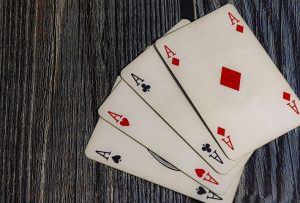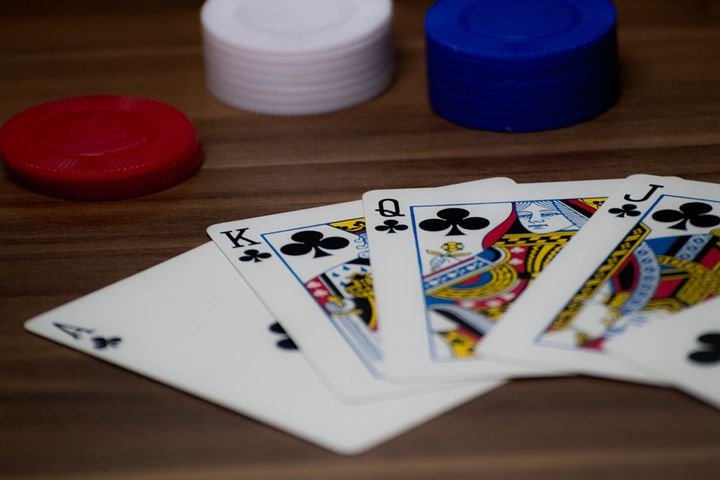Poker is a popular card game that has been played for centuries. It is a game of skill, strategy, and luck that has captivated players around the world. However, what many people may not know is that poker has fascinating connections to various sports. From golf to basketball, poker has been intertwined with some of the most popular sports in the world. In this article, we will explore some of the most interesting sporting connections of poker.
The Surprising Similarities Between Poker and Professional Sports
Poker is a game that has been around for centuries, and it has evolved into a popular pastime for millions of people around the world. But did you know that there are many surprising similarities between poker and professional sports? In this article, we will explore some of the fascinating sporting connections of poker.
One of the most obvious connections between poker and professional sports is the competitive nature of both activities. Just like in sports, poker players are constantly striving to improve their skills and outperform their opponents. They study the game, analyze their opponents’ strategies, and work tirelessly to gain an edge. In many ways, poker is like a mental sport, where players must be able to think quickly and make split-second decisions under pressure.
Another similarity between poker and professional sports is the importance of discipline and focus. In order to succeed in either activity, players must be able to maintain their concentration and avoid distractions. This requires a great deal of mental discipline, as well as physical stamina. Just like athletes, poker players must be able to perform at their best for extended periods of time, often enduring long hours of intense competition.
In addition to these similarities, there are also many specific connections between poker and certain sports. For example, many professional athletes are known to be avid poker players. Some of the most famous examples include NBA star LeBron James, NFL quarterback Tom Brady, and tennis legend Rafael Nadal. These athletes have all spoken about how playing poker helps them to stay mentally sharp and focused, which in turn helps them to perform better on the field or court.
Another interesting connection between poker and sports is the use of statistics and analytics. In both activities, players use data and analysis to gain insights into their opponents’ strategies and tendencies. In poker, this often involves tracking the frequency with which opponents bet, raise, or fold in certain situations. In sports, it might involve analyzing an opponent’s performance in certain game situations, or studying their physical attributes and tendencies.
Finally, there is also a strong connection between poker and the concept of “mind games.” Just like in sports, poker players often use psychological tactics to gain an advantage over their opponents. This might involve bluffing, or making strategic bets to induce opponents to make mistakes. In many ways, poker is a game of strategy and psychology, where players must be able to read their opponents’ emotions and intentions in order to succeed.
The connections between poker and professional sports are many and varied. From the competitive nature of both activities, to the importance of discipline and focus, to the use of statistics and analytics, there are many similarities between these two worlds. Whether you are a sports fan or a poker player, it is clear that there is much to be gained from exploring the fascinating connections between these two activities. So why not give it a try and see what you can learn? Who knows, you might just discover a new passion for both sports and poker!
The Evolution of Poker as a Competitive Sport
Poker has its roots in Europe, and it was first played in the 16th century. The game was originally called “poque,” and it was played with a deck of 20 cards. The game was introduced to the United States in the 19th century, and it quickly became popular among gamblers and cowboys. The game was played in saloons and on riverboats, and it was often associated with gambling and cheating.
In the early 20th century, poker began to evolve into a more structured game. The game was standardized, and rules were established to ensure fair play. The World Series of Poker was established in 1970, and it quickly became the premier poker tournament in the world. The tournament attracted the best players from around the world, and it helped to establish poker as a legitimate competitive sport.
Today, poker is played in casinos and online, and it is enjoyed by millions of people around the world. The game has evolved into a complex and strategic game, and it requires skill, patience, and a bit of luck to be successful. The game has also become a popular spectator sport, with televised tournaments and live streams attracting millions of viewers.
One of the fascinating sporting connections of poker is its connection to chess. Both games require strategic thinking and the ability to anticipate your opponent’s moves. In fact, many top poker players are also skilled chess players. The two games also share a common history, as both were played by royalty and aristocrats in Europe.
Another interesting connection is between poker and golf. Both games require mental toughness and the ability to stay focused under pressure. Many professional golfers are also avid poker players, and they often play poker to relax and unwind after a round of golf.
Poker also has a connection to the world of sports betting. Many sports bettors also enjoy playing poker, and they often use their knowledge of sports to gain an edge at the poker table. In fact, many professional sports bettors have become successful poker players, using their analytical skills to read their opponents and make strategic decisions.
Poker has come a long way since its humble beginnings as a game played in saloons and on riverboats. The game has evolved into a competitive sport that requires skill, patience, and a bit of luck to be successful. The game has also developed fascinating connections to other sports, including chess, golf, and sports betting. Whether you are a seasoned poker player or a casual fan, there is no denying the fascinating sporting connections of this timeless game.
The Crossover Between Poker and Olympic-Level Mind Sports

One of the most interesting connections between poker and other mind sports is the fact that many of the top poker players in the world are also skilled chess players. This is because both games require a great deal of strategic thinking and the ability to anticipate your opponent’s moves. In fact, some of the most successful poker players in history, such as Erik Seidel and Dan Harrington, have also been successful chess players.
Another interesting connection between poker and other mind sports is the fact that many top poker players are also skilled at backgammon. Backgammon is another game that requires a great deal of strategic thinking and the ability to anticipate your opponent’s moves. In fact, some of the top backgammon players in the world, such as Paul Magriel and Bill Robertie, have also been successful poker players.
In addition to chess and backgammon, there are many other mind sports that have connections to poker. For example, many top poker players are also skilled at bridge, which is another game that requires a great deal of strategic thinking and the ability to anticipate your opponent’s moves. In fact, some of the top bridge players in the world, such as Bob Hamman and Jeff Meckstroth, have also been successful poker players.
Another interesting connection between poker and other mind sports is the fact that many top poker players are also skilled at Scrabble. Scrabble is a game that requires a great deal of strategic thinking and the ability to anticipate your opponent’s moves. In fact, some of the top Scrabble players in the world, such as Nigel Richards and David Gibson, have also been successful poker players.
So why do so many top poker players also excel at other mind sports? One reason may be that these games all require a similar set of skills, such as strategic thinking, the ability to anticipate your opponent’s moves, and the ability to stay focused under pressure. In addition, many of these games require a great deal of practice and dedication, which are also important qualities for success in poker.
Overall, the connections between poker and other mind sports are fascinating and demonstrate the many ways in which different games can be interconnected. Whether you are a fan of poker, chess, backgammon, bridge, Scrabble, or any other mind sport, there is no denying the importance of strategic thinking and the ability to anticipate your opponent’s moves. So the next time you sit down at the poker table, remember that you are not just playing a game – you are engaging in a sport that has deep connections to other Olympic-level mind sports.
The Role of Poker in the World of Fantasy Sports
Fantasy sports have become incredibly popular in recent years, and they allow people to create their own teams of players and compete against others in a virtual league. While fantasy sports are typically associated with traditional sports like football, basketball, and baseball, there are also many fantasy leagues that revolve around poker.
In a poker fantasy league, players draft a team of professional poker players and earn points based on their performance in real-life tournaments. Just like in traditional fantasy sports, players can trade and drop players throughout the season to improve their team’s chances of winning.
One of the most interesting aspects of poker fantasy leagues is that they allow fans to become more invested in the game of poker. While many people enjoy watching poker tournaments on television, it can be difficult to root for a particular player if you don’t have any personal connection to them. By participating in a poker fantasy league, fans can become more familiar with the top players in the game and develop a rooting interest in their success.
Another benefit of poker fantasy leagues is that they can help to increase the popularity of the game. While poker has always been a popular game, it can be difficult to attract new fans if they don’t understand the rules or know any of the players. By participating in a fantasy league, fans can learn more about the game and become more invested in its success.
Of course, there are also some challenges associated with poker fantasy leagues. One of the biggest challenges is that it can be difficult to predict the performance of individual players. Unlike traditional sports, where players have a set role and can be evaluated based on their statistics, poker players can have good or bad days based on a variety of factors. This can make it difficult for fantasy players to make informed decisions about who to draft or trade.
Despite these challenges, poker fantasy leagues are a fascinating way to connect with the game of poker and become more invested in its success. Whether you’re a casual fan or a serious player, participating in a poker fantasy league can be a fun and rewarding experience.
The world of fantasy sports has opened up new opportunities for fans to connect with their favorite games and players. While poker may not be the first sport that comes to mind when you think of fantasy leagues, it has become an increasingly popular option for fans around the world. By participating in a poker fantasy league, fans can become more invested in the game and help to increase its popularity. So why not give it a try and see what all the fuss is about?
The Impact of Poker on the Sports Industry: A Look at Sponsorship and Endorsement Deals

One of the most significant ways that poker has impacted the sports industry is through sponsorship deals. Many professional poker players have become brand ambassadors for various companies, promoting their products and services to their fans and followers. These sponsorship deals can be incredibly lucrative for both the player and the company, as they provide exposure to a large and engaged audience.
One of the most well-known examples of a poker player with a sponsorship deal is Daniel Negreanu. Negreanu is a Canadian professional poker player who has won six World Series of Poker bracelets and two World Poker Tour championship titles. He is also a brand ambassador for PokerStars, one of the largest online poker sites in the world. As part of his sponsorship deal, Negreanu promotes PokerStars on his social media channels, wears the company’s logo during tournaments, and participates in various promotional events.
Another way that poker has impacted the sports industry is through endorsement deals. While sponsorship deals typically involve promoting a specific brand or product, endorsement deals are more focused on promoting the player themselves. Endorsement deals can include everything from clothing and accessories to online training courses and coaching services.
One of the most successful poker players in terms of endorsement deals is Phil Hellmuth. Hellmuth is an American professional poker player who has won 15 World Series of Poker bracelets and is widely considered one of the greatest poker players of all time. He has endorsement deals with a variety of companies, including clothing brand Aria, poker training site Poker Brat, and online poker site Ultimate Bet.
In addition to sponsorship and endorsement deals, poker has also had an impact on the sports industry through its presence in mainstream media. Poker tournaments, such as the World Series of Poker and the World Poker Tour, are regularly broadcast on television, bringing the game to a wider audience. This increased exposure has led to more interest in the sport, as well as more opportunities for sponsorship and endorsement deals.
Overall, the impact of poker on the sports industry is significant and continues to grow. With more and more people becoming interested in the sport, there are sure to be even more sponsorship and endorsement deals in the future. Whether you’re a professional poker player or a casual fan, there’s no denying the fascinating connections between poker and the sports industry.
